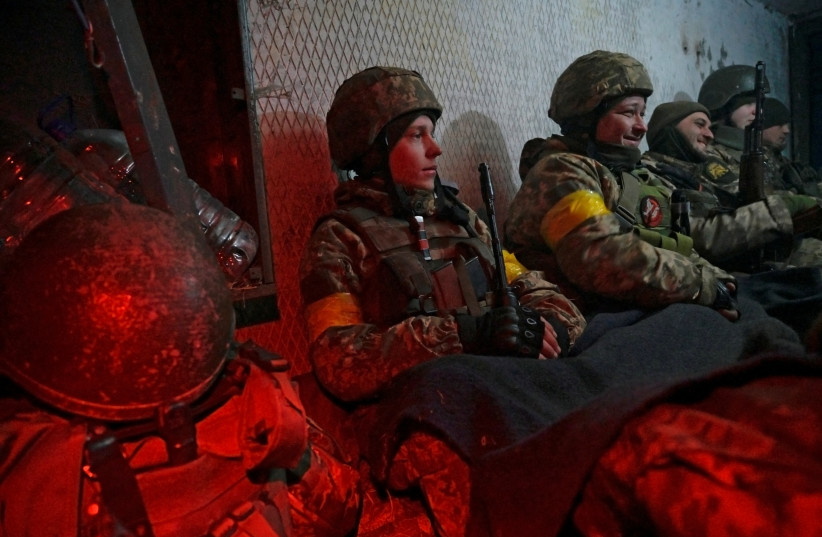Lesya Vorotnyk, a principal ballerina for the Kyiv National Opera, has taken leave from her post with the opera to take arms at another post – with Ukrainian fighting forces arrayed in Ukraine’s capital city, bracing for contact with the invading Russian army.
She was joined by Kira Rudik, a member of Ukraine’s parliament. They are two of the thousands of Ukrainian women from all walks of life taking bolstering the regular Ukrainian forces (which itself includes female conscripts).
The images of Ukrainian civilians, engaging the superior Russian military should strike a chord with Israelis, especially those who or whose parents/grandparents fought against invading Arab armies during Israel’s War of Independence (the 1948 War).
Although the wars in Ukraine and in 1948 are very different, similarities exist, including women warriors bearing the brunt of battle. In 1948, female conscripts served in the Yishuv’s underground forces and later the IDF. Plus, thousands of female civilians fought to defend their homes, especially on outlying kibbutzim and a significant number fell in these battles, particularly at Gush Etzion and Nitzanim.
Conscripted women fought alongside their male comrades (although less so as the war progressed). More than one-quarter of the Palmach, the Hagana’s elite strike force, consisted of female recruits. Palmach women served in combat roles as scouts, armed transport escorts, sappers, radio operators and medics. The Sefer HaPalmach (“The Book of the Palmach”) lists the names of 22 women who fell in the line of duty.

Two other striking similarities between the current Russia-Ukrainian war and the 1948 war: The invader’s audacity and the defenders’ tenacity. On Israel’s first day, armed forces from three neighboring countries invaded. Like Russia, the Arab side had been threatening invasion for weeks. Like Russia, these countries had no legitimate claim of sovereignty over the territory invaded and their invasion, like Russia’s, was naked aggression. The combined strength of the Arab armies was considerably superior to the Israeli forces in quality and quantity of arms.
Few expected Israel to survive, let alone defeat the invading forces. Yet, it did both, even though militarily the war was at best a lopsided stalemate, with the Arab forces managing to hold on to some of the territories they conquered. A significant reason for this outcome was the serious underestimation of the resolve and tenacity of Israel’s defenders.
It seems Russia likewise miscalculated, greatly underestimating Ukrainian resolves to stop the Russian invaders at all costs. Reminiscent of the Arab advantage over Israel in 1948, Russia enjoys near-complete mastery of Ukrainian skies and brings to bear heavy artillery against defenseless civilian targets. The Ukrainians have inadequate means of countering the onslaught, just as, during the first weeks following the Arab armies’ invasion, Israel had no aircraft, tanks or heavy artillery, allowing the Arab forces to bring all of these to bear against the nearly defenseless Israeli populace.
Like Israel in 1948, Ukraine fights alone, no foreign armies are prepared to join the battle directly. Unlike Israel in 1948, whose plight seemed to matter little to most of the international community, much of the international community stands firmly with Ukraine and is acting both diplomatically and in providing material assistance to help the Ukrainians fight back. Ironically, the only nation willing to aid Israel in 1948 by selling it arms was another Eastern European country, Czechoslovakia – with the tacit approval of the USSR.
As this article is being written, the outcome of the Russian-Ukrainian war is yet unknown. Perhaps the Russian forces will finally wear down the Ukrainians or continue to visit destruction on Ukrainian cities until there is little left to defend. But, perhaps the Ukrainians will surprise the world and put up such a fight as to cause the Russians to seek some sort of face-saving compromise – as the Arab combatants did in 1948-49. This war could also end in a military stalemate of some kind.
If so, Ukrainian women will have played a significant role on and off the battlefield in saving Ukraine from complete subjugation. Regardless of the final outcome, Ukraine’s heroic stand will be commemorated for generations to come.
While some Ukrainians are inspired by Israel’s image and history, many Ukrainian women warriors are simply following Mama’s or Babusya’s bullet casings. Ukrainian women also have a history of military heroism: A prime example is Lyudmilla Pavlichenko, a celebrated Red Army sniper credited with killing 310 Nazi soldiers during the World War II battles for Odessa and Sevastopol. While a Soviet citizen, she was a Ukrainian and did all of her fighting in Ukraine. Perhaps the Russians should have studied her more closely before discounting Ukrainian resistance out of hand.
Pavlichenko was not unique. Multitudes of Soviet women fought in the Great Patriotic War (World War II), both in the Red Army and independent Partizan guerrilla forces. Some were Jews who later made their way to Palestine where they inspired the young women and men of the Yishuv. In general, the heroic stance of the Soviet Union against Nazi Germany, notwithstanding the terrible losses in life and property the Soviet peoples - which included Russians and Ukrainians - suffered at the hands of the Germans, provided much encouragement and inspiration to the Yishuv.
It is well known that the Jews did not have an entirely happy history - to put it mildly - in the centuries Jews dwelt in Ukraine. But today, as many of us watch in horror and heart break the evil onslaught Russia has unleashed, we admire the brave resistance and see a reflection of our own heroes and can say earnestly: “Today We Are All Ukrainians – Slava Ukraini-Heroiam Slava – Glory to Ukraine-Glory to (her) Heroes.” And of course, her heroines.
The writer is an attorney in Seattle. He has been researching and writing a book on the Palmach and its experiment as a gender-egalitarian fighting force, the source of much of the information in this article.
